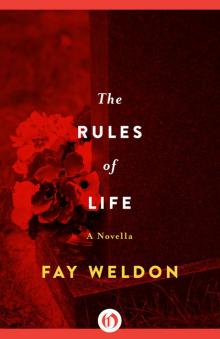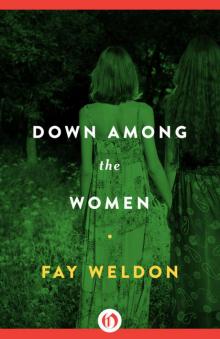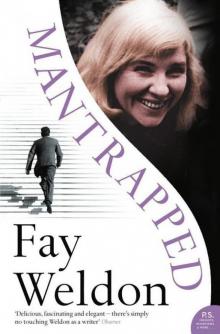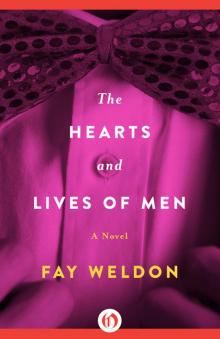- Home
- Fay Weldon
The Rules of Life Page 6
The Rules of Life Read online
Page 6
Be that as it may, it was obvious to me that money was the least of the Toveys’ worries. Depression, however, may well have been. I saw a Rolls Royce parked in the drive, and a Bentley in the garage, but both in a dull old-fashioned black, not the brilliant spots and swirls so popular these days. The interior of the Toveys’ house, though flawlessly decorated, was bleak and reproachful in its grandeur: the very flowers in the vases seemed to sigh and wilt in the unkind light of central chandeliers which sent unflattering shadows through the too-high rooms. The many leather couches were so plumply upholstered as to make it more likely that they would throw one off than welcome one in. It was a household run by a woman on a perpetual diet of the senses. It would be uncharitable of me to suggest a likeness between Honor and Janice Tovey—suffice it to say that I understood at once why Timothy Tovey should have sought solace in Gabriella’s arms.
Mrs Tovey being out at a fund-raising, I could not pass on Gabriella’s message to her in person—somewhat, I must say, to my relief. I was shown instead into the library, where I found Timothy Tovey, a courteous white-haired man who still had about him the remnants of the vigorous good looks of his youth. I had, I think, expected to see him bowed down by grief at the loss of Gabriella, but he seemed cheerful enough, even lively. He was obviously a man with a great appetite for life. He talked to me freely; he was a member of the GNFR and although I am not of the high priesthood I am sufficiently advanced in the lay hierarchy to hear confession, or, as we like to call it, life-story.
‘What, my Gabriella!’ he exclaimed. ‘Taped by the priests! Come back as a re-wind! Well, it doesn’t surprise me. That woman’s egocentricity would survive a hundred deaths. Waiting for me in the hereafter? Janice isn’t going to like that! Waiting for Janice, too, you say? Oh, my Lord!’ And he laughed, heartily.
I was, I must say, a little taken aback. He apologised. ‘I loved Gabriella,’ he said, ‘very much indeed at one time of my life. But is there to be no end to love? I held her hand when she died simply because she had sent for me, quite out of the blue. I had not seen her or spoken to her for twenty years: though GSWITS knows she had cost me enough in that time. And, seeing her as she was, old and ill, on her deathbed, it was hard to remember just why she had inspired such passion in me. She could be a very trying woman, you know. She once refused to see me for two years, on the grounds that she had discovered I slept with my own wife in a double bed!’
‘Three,’ I said. I tried not to sound too reproachful. Timothy Tovey had his part to play. As do we all.
‘As long as that? I can hardly remember. But I do recall she wanted to run off with some Greek waiter: she spent two years trying to persuade him to marry her, but she failed and came back to me. That was what all that was about. Did she tell you the truth? I doubt it. I first encountered her via her dental X-rays. We shared the same dentist, way back, when I was young. The poor man was obviously hopelessly in love with her—quite deranged. “See,” I remember him saying, waving the X-ray plates of a total stranger in front of me, as I reclined helpless in his chair, “a perfect arch! A crime if anything, happens to those teeth.” I could not help but notice the name. Gabriella Sumpter! It entranced me, together with the concept of a perfect arch. And I suppose it is in a man’s nature to love and want what another man loves and wants, albeit a dentist. So I sought out the young woman, and found the most beautiful creature imaginable, living with, though not married to, a prosperous, fashionable and very boring young doctor. I resolved at once to make her my mistress.’
And so the sorry story continued. Timothy Tovey had no intention of damaging his prospects in the diplomatic service by marrying Gabriella, though he confessed to promising her he would, the more easily to seduce the poor woman. They succeeded in keeping their relationship hidden from the doctor for some years, until Miss Martock, then resident as housekeeper in Orme Square, eventually became party to it—and she it was who, under a terrible burden of guilt, informed Aldred Ray about what was going on under the pear tree at home, and in a little service flat in Mayfair away from home. Gabriella forgave Miss Martock for her indiscretion—she relied heavily by then upon her housekeeper’s dressmaking skills. But Aldred could not forgive Gabriella; alas, he hanged himself in the bathroom, there where little pink-lacquered birds flew across gilded tiles. After which scandal, of course, it was all the more difficult for Timothy Tovey to regularise his relationship with Gabriella, although he did admit that at this stage he very much wanted to. He introduced Gabriella to his mother, and to his surprise Lady Julia quite liked the girl, in spite of her past, and would almost, he thought, have consented to the match, and encouraged him to face and overcome any consequent difficulties in his career, had it not been for Gabriella’s extraordinary behaviour, one morning, over the spoiling in the wash of a cheap muslin nightgown. She had fussed and carried on as if it had been some expensive silk extravaganza, quite spoiling Lady Julia’s breakfast. It was apparent that the girl had no idea at all how to manage the servants. She had been badly brought up. A diplomat’s wife has to know how to deal with staff. It is the key to her husband’s success.
And so, thoughts of marriage were abandoned and Gabriella was set up by Lady Julia in the little house in St John’s Wood, where it seemed she could do no harm. Here, Timothy Tovey explained, he was a frequent visitor, until shortage of money obliged him to marry Janice—a less distant relative of royalty—who was able to both line his pocket and further his career.
‘I loved Janice,’ Timothy Tovey said to me, ‘as a man loves a wife, and I appreciated Gabriella as a man appreciates a mistress. The wife stokes the fire; the mistress warms her hands at the blaze.’ The passion between himself and Gabriella had gradually faded. Some ten years into the marriage, when Janice had put him on a diet, came a time when the flame rekindled, and Timothy Tovey visited Gabriella more frequently than the once-a-fortnight which had been his custom. But that too soon passed. The bedclothes, he complained, were always uncomfortably scratchy. Finally the visits stopped altogether.
Children? They had never discussed the matter. It would have been totally inappropriate for Gabriella to have had his, Timothy Tovey’s, offspring. He could not have acknowledged them. Nor, he thought, would he have continued to support Gabriella had she had children by another man. As it was, he believed he had dealt very fairly with her. But still sometimes, just sometimes, he would wake up in the night, and reach out for Gabriella, and find instead the staunch body of Janice.
‘And you feel like weeping,’ I finished his sentence for him, since he could not, ‘but quite what for you can’t make out.’
We were interrupted by the arrival of Janice Tovey, and I was not sorry. He seemed to be telling me a tale of waste and sorrow: of lives and happiness thrown away. But Janice, although I must say plain of feature, was a determined and positive woman, who seemed to have lived a good enough life, and when warned by her husband that Gabriella was roaming the city as a re-wind merely laughed and said: ‘She never bothered me when she was alive. Why should she now she’s a ghost?’ Poor Gabriella, I thought. The only one in the world to take herself seriously—but that, no doubt, is the fate of women who do not marry, and who do not have children, for whatever reason.
‘Love’, I said reflectively to Honor, when I got home, ‘is a woman’s whole existence. To men, it is a thing apart.’ Honor just laughed, and put a plate of high-fibre beans on unbuffered whole meal toast in front of me, and said I had changed, probably for the better, but I must now stop thinking about love and get on with the reform of the GNFR. Honor is, of course, quite right. Strange days, indeed. Oh, strange days.
About the Author
Novelist, playwright, and screenwriter Fay Weldon was born in England, brought up in New Zealand, and returned to the United Kingdom when she was fifteen. She studied economics and psychology at the University of St Andrews in Scotland. She worked briefly for the Foreign Office in London, then as a journalist, and then as an advertising copywriter. She l
ater gave up her career in advertising, and began to write fulltime. Her first novel, The Fat Woman’s Joke, was published in 1967. She was chair of the judges for the Booker Prize for fiction in 1983, and received an honorary doctorate from the University of St Andrews in 1990. In 2001, she was named a Commander of the British Empire.
Weldon’s work includes more than twenty novels, five collections of short stories, several children’s books, nonfiction books, magazine articles, and a number of plays written for television, radio, and the stage, including the pilot episode for the television series Upstairs Downstairs. She-Devil, the film adaption of her 1983 novel The Life and Loves of a She-Devil, starred Meryl Streep in a Golden Globe–winning role.
All rights reserved under International and Pan-American Copyright Conventions. By payment of the required fees, you have been granted the non-exclusive, non-transferable right to access and read the text of this ebook onscreen. No part of this text may be reproduced, transmitted, downloaded, decompiled, reverse engineered, or stored in or introduced into any information storage and retrieval system, in any form or by any means, whether electronic or mechanical, now known or hereinafter invented, without the express written permission of the publisher.
This is a work of fiction. Names, characters, places, and incidents either are the product of the author’s imagination or are used fictitiously. Any resemblance to actual persons, living or dead, businesses, companies, events, or locales is entirely coincidental.
Copyright © 1987 by Fay Weldon
978-1-4804-1259-0
Cover design by Connie Gabbert
This edition published in 2013 by Open Road Integrated Media
345 Hudson Street
New York, NY 10014
www.openroadmedia.com
EBOOKS BY FAY WELDON
FROM OPEN ROAD MEDIA
Available wherever ebooks are sold
Open Road Integrated Media is a digital publisher and multimedia content company. Open Road creates connections between authors and their audiences by marketing its ebooks through a new proprietary online platform, which uses premium video content and social media.
Videos, Archival Documents, and New Releases
Sign up for the Open Road Media newsletter and get news delivered straight to your inbox.
Sign up now at
www.openroadmedia.com/newsletters
FIND OUT MORE AT
WWW.OPENROADMEDIA.COM
FOLLOW US:
@openroadmedia and
Facebook.com/OpenRoadMedia

 Trouble
Trouble The Heart of the Country
The Heart of the Country Wicked Women
Wicked Women Mischief
Mischief Long Live the King
Long Live the King Remember Me
Remember Me Worst Fears
Worst Fears Chalcot Crescent
Chalcot Crescent Moon Over Minneapolis
Moon Over Minneapolis The New Countess
The New Countess Splitting
Splitting After the Peace
After the Peace Habits of the House
Habits of the House Darcy's Utopia
Darcy's Utopia The Rules of Life
The Rules of Life Kehua!
Kehua! Before the War
Before the War Darcy's Utopia: A Novel
Darcy's Utopia: A Novel Down Among the Women
Down Among the Women Letters to Alice
Letters to Alice 3 Great Historical Novels
3 Great Historical Novels Female Friends
Female Friends Mantrapped
Mantrapped The Bulgari Connection
The Bulgari Connection The Hearts and Lives of Men
The Hearts and Lives of Men Death of a She Devil
Death of a She Devil